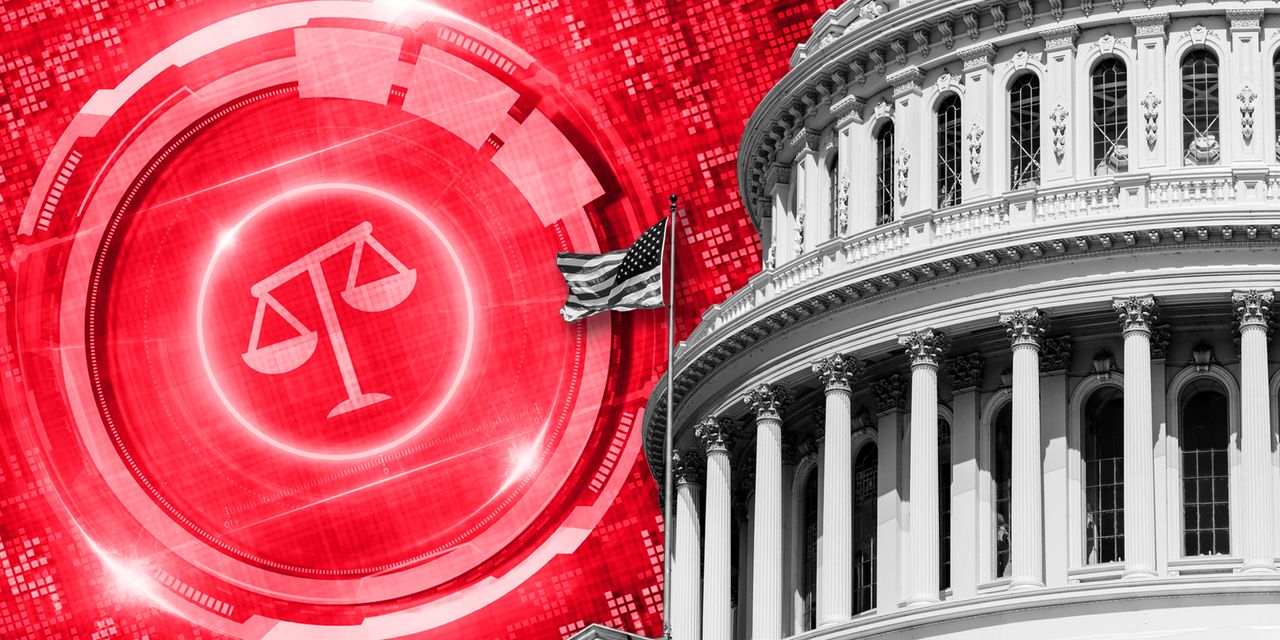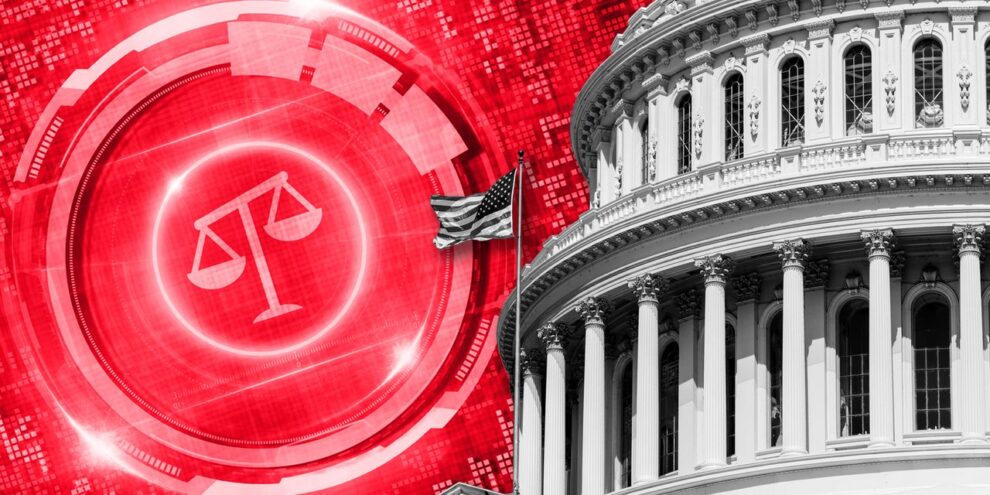
For 20 years, Congress has stood by and failed to regulate technology as tech has changed rapidly and become an integral part of Americans’ lives.
Democrats promised to change that in the last election cycle. While winning the presidency and both houses of Congress, they promised to crack down on the immense and growing power of Big Tech companies like Apple Inc. AAPL, -3.77%, Alphabet Inc. GOOGL, -5.41% GOOG, -5.44%, Amazon.com Inc. AMZN, -4.76% and Facebook parent Meta Platforms Inc. META, -4.15% by reshaping antitrust law.
With less than a month to go before the members of the 117th Congress leave to rally voters again, though, they have failed to actually accomplish anything. A coming chance for some legislative change is an antitrust bill that many believe is flawed, but it could be voted on by the Senate this September.
Don’t miss: As Congress flounders in Big Tech regulation push, the FTC isn’t waiting around
The American Innovation and Choice Online Act is meant to prevent dominant firms from favoring their own services and disadvantaging rivals, or discriminating against businesses or biasing search results in favor of its own services. It is a bid to regulate the large digital platforms of our day, all of which have faced recrimination for these types of practices — Google favoring in-house shopping results, Apple and Android restricting payment services in their respective app stores and on iPhones specifically, Amazon competing against its own merchants on its e-commerce platform, Facebook’s “Buy or Clone” approach to competition.
The bill, co-authored by Sen. Amy Klobuchar (D., Minn.) and Sen. Chuck Grassley (R., Iowa) and believed by its sponsors to have enough votes in the Senate to move forward, has been stalled for months after dramatic hearings involving tech CEOs. Sen. Chuck Schumer (D., N.Y.) the Democratic majority leader, said he would get the bill to the floor in May, but more pressing legislation popped up.
Now, there is a narrow window of three weeks in September before midterm elections take Congress away from the Capitol, with the chance that Republicans reclaim the majority in one or both chambers. Schumer is again messaging that he is trying to get the bill to the floor, but even that would likely be an empty vote if a lame-duck House returns with the majority set to change. A companion bill, introduced in the House by Rep. David Cicilline (D., RI), has long been stalled.
For more: Republicans’ midterm edge over Democrats erodes in this one key indicator
But the Klobuchar sponsored bill in its current form is flawed. Instead of attempting to determine market size and share in the different arenas that only the biggest of Big Tech can play in, the bill targets platform companies based on their valuations — companies worth $550 billion and up or with annual revenue of $550 billion or more warranted extra scrutiny, during any 180-day period during a 2-year period.
No need to worry about the revenue part for now — Amazon may get there next year, but none have hit that mark even while having their best year ever. Facebook parent Meta, though, has already sunk well lower than a $550 billion market cap, checking in at less than $450 billion recently amid struggles in the advertising industry. While Meta Platforms could still hit the target based on previous valuations, staying this low for awhile could clear it from the new standards by the time they’re implemented.
The bill’s attempt to very precisely target these Big Tech companies while making new antitrust law is at the heart of critics’ issues with the self-preferencing bill.
“It is not a very good bill as drafted,”Herbert Hovenkamp, an antitrust expert and the James G. Dinan University Professor at the Penn Carey Law and the Wharton School, at the University of Pennsylvania.
“It limited its coverage to very large digital platforms, like Apple, Facebook, Google and Amazon,” Hovenkamp said . “Secondly, it assigns these rules like self-preferencing without regard to the market share of the particular product. In antitrust, we look at the market share of the product.”
While angering those with more traditional views of antitrust law, the self-preferencing bill does not go far enough to satisfy those looking for a bigger push against Big Tech’s power. Ed Mills, a Raymond James analyst based in Washington who monitors government policy, said “we are still nibbling at the edges” with current legislation.
“Even if they do ultimately pass these — and the tech industry would prefer that these bills do not pass — I don’t see anything that would alter the business model of the tech industry,” said Ed Mills, a Raymond James analyst based in Washington who monitors government policy, talking both of this bill and data-privacy efforts.
One of the reasons that proponents of tech regulation feel the bill doesn’t go far enough is because Big Tech means big money and big influence as well. By the time these bills actually make it from committees for a vote, they have been watered down by markup after markup, via lobbyist influence and tech company concerns. They seem imperfect on many levels.
Read from Jon Swartz: The clock is running out for Congress to pass Big Tech antitrust legislation
“Lobbying is a big part of it, you have a lot of money from four major companies saying this is going to be bad for consumers,” said Rebecca Haw Allensworth, the David Daniels Allen Professor of Law at Vanderbilt University, who teaches an antitrust course focused on Big Tech. “That always plays a role. And the point of everyone not being able to agree, that is a problem…progressives are against this bill too.”
Unlike Europe, U.S. legislators have also been convinced not to act by arguments that actions against Big Tech will hurt smaller players as well, a common talking point for the company and their lobbyists. Pervasive complaints filed by third-party sellers about discrimination, via their rankings on Amazon could lead to Amazon ultimately removing third parties, and thus leading to less choice and higher prices for consumers.
The fines proposed by the latest version of the antitrust reform bill were lowered to 10% from 15% of revenue, but many fear that the real cost would be to consumers who would pay higher prices, if some selection is removed. This argument, though, is also one that the tech companies like to focus on, that their services are free, they offer the lowest cost services, they offer more choice.
Hovenkamp, while acknowledging that he is not a day-to-day Congress watcher, contends that the bill should be broader on top and also define specific markets where self-preferencing is going to be an issue.
“Google has well over 90% of search, but why do we want to mess around with grocery sales, and all these other things, because this is going to be expensive.”
He believes a better approach to antitrust, instead of the odd preferencing bill, would be to focus on the anticompetitive acquisitions constantly being made by tech giants, seeking to quash and integrate small potential threats.
“The dominant platforms are buying up threatening upstarts before they become rivals,” he said, using Facebook’s acquisition of Instagram right before the company’s 2012 IPO as a prime example. And now “Facebook is running scared today of TikTok. There are so many things we could be doing where there are real competitive problems, rather than this goofy preferences thing.”
Read more about Meta Platform’s recent earnings disaster
The Federal Trade Commission is getting more aggressive as Congress has been hamstrung. In late July, the FTC filed a suit against Meta to block its acquisition of Within Ltd., the developer of a popular virtual reality fitness app called Supernatural, stating that Facebook’s parent is trying to “buy its way to the top.”
We cannot rely on the FTC and other regulatory bodies to act without the proper laws at their disposal, though. Attempts at recent litigation have for the most part fallen flat. For example, the first attempt of an antitrust suit by the Federal Trade Commission against Facebook’s parent was dismissed. The FTC filed a new version of its case last year. The case is still ongoing.
“This is seismic change at a glacial pace,” said Mills of Raymond James. “This is something that will take time and it probably is going to be one step forward, two steps back, as actions at the regulatory level will probably be overturned by the courts.”
Congress has failed to even take one step forward in the past two years, and a single vote on a single bill in September — if they even manage to accomplish that — will do little to ignite change. If Democrats want to use Big Tech to score points with voters, they need to act on their promises and finally regulate the internet, as their predecessors have avoided doing for far too long.











Add Comment